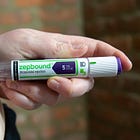This Week in Biotech #16
Catch up on the latest biotech breakthroughs and upcoming trends (Oct 1-4).
Welcome to This Week in Biotech by Biotech Blueprint!
This week, I’m publishing This Week in Biotech on Saturday, which also includes updates from Friday. Future editions will continue to be released on Fridays, as usual.
MARKET UPDATES
🔹 On Oct. 4, Capricor Therapeutics (CAPR) announced an upcoming presentation of three year safety and efficacy data from the HOPE-2 open-label extension study of deramiocel (CAP-1002), aimed at treating Duchenne muscular dystrophy. The study findings will be shared in a late-breaking poster presentation at the 29th Annual Congress of the World Muscle Society from October 8-12, 2024, in Prague. This announcement led to a 20% stock rally.
🔹 On Oct. 4, Cue Biopharma (CUE) announced that it will present clinical data for its Immuno-STAT drug candidates, CUE-101 and CUE-102, at the Society for Immunotherapy of Cancer’s 39th Annual Meeting in Houston, TX, from November 6-10, 2024. CUE-101’s presentation will focus on a phase 1 study in patients with metastatic HPV16+ head and neck cancer, while CUE-102’s presentation will address a phase 1 trial in patients with WT1-positive recurrent/metastatic cancers. Following the announcement, Cue Biopharma’s stock saw a nearly 40% increase.
🔹 On Oct. 3, Summit Therapeutics (SMMT) announced the FDA has granted Fast Track designation for ivonescimab in patients where prior PD-1 monoclonal antibodies have failed in phase 3 trials. This led to a brief increase in the company’s shares premarket Friday.
🔹 On Oct. 3, Theriva Biologics (TOVX) announced that the Data and Safety Monitoring Committee has positively reviewed the safety and pharmacokinetic data from the second cohort of its phase 1b/2a clinical trial of SYN-004 (ribaxamase) in allogeneic hematopoietic cell transplant recipients. The company’s shares rose 45% on Thursday.
🔹 On Oct. 2, Absci (ABSI) received a Buy rating by Guggenheim, initiating coverage with a $10.00 price target, highlighting the company’s innovative use of AI in biologics development and its proprietary platform’s ability to assess millions of antibody variants. The firm also noted Absci’s recent collaboration with AstraZeneca for AI-designed antibody sequences in oncology. Additionally, TD Cowen and Morgan Stanley maintained their positive outlooks on Absci, issuing Buy and Overweight ratings, respectively.
🔹 Septerna, a clinical-stage biotech company based in San Francisco, has filed for an IPO with the Securities and Exchange Commission. The company did not disclose the number of shares it plans to offer or the expected price range. In 2023, Septerna reported a net income of $567,000 on revenues of $151,000, a significant turnaround from the previous year, when it incurred a loss of $27.7M without reporting any revenue. Septerna intends to list its shares on the Nasdaq Capital Market under the ticker symbol SEPN.
🔹 As mentioned in Wednesday’s This Week in Biotech, Gritstone bio (GRTS) reported phase 2 data for its neoantigen immunotherapy, Granite, showing a 21% reduction in progression or death in colorectal cancer patients, with a 38% reduction in those with lower circulating tumor DNA. Despite the positive results, the company’s stock dropped by 62%. On Oct. 2, Gritstone bio’s stock was downgraded from Buy to Neutral by B.Riley, with the price target cut from $3.00 to $1.00, mainly due to limited cash reserves and a $40M debt.
BIOTECH NEWS
🔹 The U.S. government is allocating $72M to vaccine manufacturers CSL Seqirus, Sanofi, and GSK to prepare bird flu vaccines for potential distribution. Although there are currently no vaccination recommendations for the general U.S. population against bird flu, officials emphasize the need for preparedness. The funding is expected to double the existing stockpile of ready-to-use vaccines, aiming for over 10M doses by early 2025.
🔹 On Oct. 4, the European Medicines Agency (EMA) initiated a review of hair loss medicines due to concerns about suicidal thoughts and behaviors associated with their use. These medications are primarily prescribed for treating androgenic alopecia in young men and benign prostatic hyperplasia in older men.
🔹 The FDA has removed Eli Lilly’s weight-loss drug Zepbound and diabetes medication Mounjaro from its shortage list, a decision announced on Oct. 2. This change is expected to impact the market for compounded drugs, which are custom-made alternatives created to meet demand when specific medications are in short supply. Read more about compounded GLP-1s here:
🔹 On Sept. 30, Kezar Life Sciences paused patient enrollment and dosing in its phase 2b PALIZADE trial of zetomipzomib for lupus nephritis after four deaths in patients from the Philippines and Argentina. On Oct. 4, the company announced that the FDA has placed a clinical hold on zetomipzomib.
🔹 On Oct. 4, Exact Sciences announced that the FDA approved the Cologuard Plus test, a non-invasive screening tool for colorectal cancer. The test, designed for adults aged 45 and older at average risk, achieved sensitivities of 95% for colorectal cancer and 43% for advanced precancerous lesions at 94% specificity. The company expects this test to reduce unnecessary follow-up colonoscopies by decreasing the rate of false positives.
🔹 On Oct. 3, Avidity Biosciences announced that the FDA has lifted the partial hold on its treatment delpacibart etedesiran for myotonic dystrophy type 1. This investigational therapy is currently undergoing phase 3 trial for this progressive neuromuscular disease. The hold was initiated by the FDA in 2022 due to a serious adverse event reported in a patient enrolled in the phase 1/2 trial but specifics of this adverse event have not been disclosed by the company.
🔹 On Oct. 2, Gilead announced royalty-free licensing agreements with six generic manufacturers to produce and distribute low-cost versions of lenacapavir, a drug for HIV prevention, in 120 primarily low- and lower-middle-income countries. The initiative includes lenacapavir for both prevention and treatment of HIV in heavily treatment-experienced adults with multi-drug resistant HIV. Gilead plans to supply the drug at no profit until generic manufacturers can meet the demand.
🔹 On Oct. 2, Recursion announced that the FDA has cleared its investigational new drug application for REC-1245 for treating biomarker-enriched solid tumors and lymphoma. REC-1245 represents a potential first-in-class therapy and is part of Recursion’s AI-driven platform. This platform accelerated REC-1245’s development from target identification to investigational new drug application in under 18 months. The company plans to initiate a phase 1/2 clinical trial in Q4 2024 to evaluate its safety and efficacy.
🔹 On Oct. 1, 2024, BioNTech hosted its inaugural AI Day, highlighting its strategy to AI across its immunotherapy pipeline. The company announced the introduction of a new near exascale supercomputer named Kyber, which will enhance its computational capabilities, and unveiled novel AI Bayesian Flow Network models for protein sequence generation. CEO Ugur Sahin emphasized the potential of these technologies to unlock new therapeutic possibilities, positioning BioNTech at the forefront of AI-enhanced biopharmaceutical development, with a focus on individualized vaccines and targeted therapies.
CLINICAL TRIAL UPDATES
🔹 On Oct. 4, Relief Therapeutics announced positive topline results from a study for RLF-OD032, an oral treatment of phenylketonuria. The study demonstrated that RLF-OD032 achieved peak and total drug exposure comparable to BioMarin’s Kuvan. RLF-OD032 can be taken without water and requires a lower dosage compared to Kuvan. The company plans to proceed with a pivotal bioequivalence trial as part of its new drug submission to the FDA.
🔹 On Oct. 4, Biodexa Pharmaceuticals provided an update on its phase 1 study of MTX110, a treatment for recurrent glioblastoma, indicating promising results. Among four patients, two have passed away with overall survival times of 12 and 13 months, while two others remain under follow-up. These outcomes are favorable compared to typical survival rates for glioblastoma, which range from 2-9 months.
🔹 On Oct. 3, Summit Therapeutics announced the completion of patient enrollment in its phase 3 HARMONi trial, which evaluates ivonescimab combined with platinum-doublet chemotherapy against placebo plus chemotherapy in patients with EGFR-mutated, advanced non-small cell lung cancer (NSCLC). This trial is particularly significant as it targets a population where prior PD-1 monoclonal antibodies have failed in phase 3 trials. The company expects to release topline data from the study in mid-2025. Additionally, the FDA has granted Fast Track designation for ivonescimab in this patient population.
SCIENCE SPOTLIGHT
🔹 In 2024, mpox has emerged in 15 African countries, marking the continent’s most severe outbreak to date, leading health officials to initiate vaccination efforts. Although vaccines were previously unavailable in Africa, they have started to arrive following a renewed global public health emergency declaration. Countries like Rwanda, the DRC, and Nigeria are beginning targeted vaccination campaigns focused on high-risk populations, including healthcare workers and sex workers. With over 31,400 suspected infections and 844 deaths reported this year, the distribution will prioritize hotspots while monitoring vaccine effectiveness against the circulating clade Ib virus. Successful control of the outbreak will require more than vaccination; comprehensive public health measures, including risk communication and local manufacturing of diagnostic tools and drugs, are also essential for long-term management. Read the article published on Nature News. Also read one of my recent deep dives on the current mpox outbreak:
🔹 A comprehensive study discussed in Nature News on Oct. 3 involving nearly 400,000 researchers from 38 countries revealed that around one-third of scientists stop publishing within five years, and nearly half leave the field entirely within a decade. The data, derived from Scopus, showed a notable gender disparity, with women being more likely than men to exit research, particularly in life sciences. Factors contributing to this trend include toxic workplace environments, family responsibilities, and tenure status. Despite some improvements in retention rates for women in recent years, significant disparities remain, especially across different disciplines. The study highlights the need for further research to understand why scientists leave academia and suggests that interviews and surveys could provide deeper insights.
🔹 An analysis of Nobel Prize data indicates a complex landscape in the awarding of prizes across scientific disciplines. It highlights a notable underrepresentation of women among laureates, although their chances of winning have improved since 2000. The findings also reveal that age, geographical location, and academic lineage significantly impact the likelihood of winning a Nobel Prize. The data suggests that individuals born in North America have the best chance, while working in the labs of past winners increases the odds of future recognition. Notably, over half of all prizes are awarded to individuals in five key subject areas, with a strong connection among laureates through academic networks.
ON THE HORIZON
🔹 October is here and below are October 2024 FDA PDUFAs:
Oct. 4: Biofrontera’s Ameluz (supplemental new drug application to increase treatment dosing) for actinic keratoses.
Oct. 8: Zealand Pharma’s dasiglucagon for treatment of congenital hyperinsulinism.
Oct. 8: Bristol Myers Squibb’s two supplemental biologics applications for Opdivo (nivolumab): Opdivo with chemotherapy followed by surgery and adjuvant Opdivo for the perioperative treatment of resectable stage IIA to IIIB non-small cell lung cancer (NSCLC).
Oct. 17: Amgen’s Lumakras/Lumykras for treatment of metastatic colorectal cancer.
Oct 21: Camurus’ octreotide SC depot (CAM2029) for acromegaly (pituitary gland hormonal disorder).
Thanks for reading Biotech Blueprint and have a great weekend.
DISCLAIMER: This content is for informational purposes only. It should not be taken as legal, tax, investment, financial, or other advice. The views expressed here are my own and do not reflect the opinions of any company or institution.
DISCLOSURE: I have no business relationships with any company mentioned in this article.






